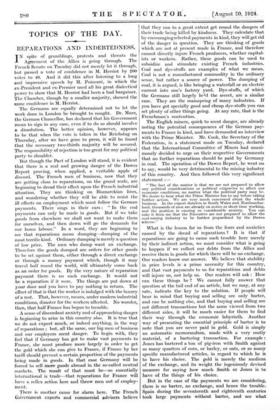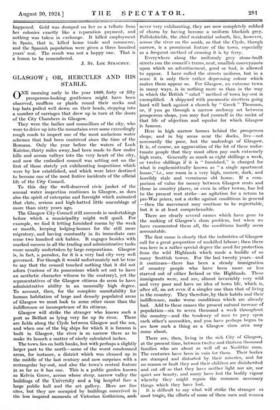TOPICS OF THE DAY.
REPARATIONS AND INDEBTEDNESS.
IN spite of grumblings, protests and threats the Agreement of the Allies is going through. The French Senate on Tuesday did not merely let it through, but passed a vote of confidence in M. Herriot by 200 votes to 40. And it did this after listening to a long and impressive speech by M. Poincare, in which the ex-President and ex-Premier used all his great dialectical power to show that M. Herriot had been a bad bargainer. The Chamber, though by a smaller majority, showed the same confidence in M. Herriot.
The Germans are equally determined not to let the work done in London be brought to nought. Dr. Marx, the German Chancellor, has declared that his Government mean to sign in any case, even if to do so should involve a dissolution. The better opinion, however, appears to be that when the vote is taken in the Reichstag on Thursday, after we have gone to press, it will be found that the necessary two-thirds majority will be secured. The responsibility of rejection is too great for any political party to shoulder.
But though the Pact of London will stand, it is evident that there is a real and growing danger of the Dawes Report proving, when applied, a veritable apple of discord. The French men of business, now that they are getting close to reparations, on the grand scale, are beginning to dread their effect upon the French industrial situation. They are thinking on Bismarckian lines, and wondering whether they will be able to resist the ill effects on employment which must follow the German payments. There sings in their ears : "In the end payments can only be made in goods. But if we take goods from elsewhere we shall not want to make them for ourselves, and then down will go the demands for our home labour." In a word, they are beginning to see that reparations mean dumping—dumping of the most terrific kind. Ordinary dumping is merely a question of low price. The men who dump want an exchange. Therefore the goods dumped are orders for other goods to be set against them, either through a direct exchange or through a money payment which, though it may travel half round the world, will ultimately come back as an order for goods. By the very nature of reparation payment there is no such exchange. It would not be a reparation if it were. The things are put down at your door and you have to pay nothing in return. The effect of that is that the worker is indulged with the luxury of.a rest. That, however, means, under modern industrial conditions, disaster for the workers affected. No wonder, then, that half France has begun to tremble.
A sense of discordant anxiety and of approaching danger is beginning to arise in this country. also. It is true that we do not expect much, or indeed anything, in the way of reparations ; but, all the same, our big men of business and our employers scent danger. To begin with, they feel that if Germany has got to make vast payments to France, she must produce more largely in order to get the gold which she can give to France, if France by her tariff should prevent a certain proportion of the payments being made _ in goods. In that case Germany will be forced to sell more goods abroad in the so-called neutral markets. The result of that must be—so essentially international is trade—that reparations for France will . have a reflex action here and throw men out of employ- ment.
There is another cause for alarm here. The French GOvernment experts and commercial advisers believe that they can to a great extent get round the dangers of their trade being killed by kindness. They calculate that by encouraging selected payments in kind, they will get rid of the danger in question. They are thinking of goods which are not at present made in France, and therefore cannot directly injure French producers, whether capital- ists or workers. Rather, these goods can be used to subsidize and stimulate existing French industries. Coal and dye-stuffs are examples of what we mean. Coal is not a manufactured commodity in the ordinary sense, but rather a source of power. The dumping of coal, it is argued, is like bringing a waterfall or an electric current into one's factory yard. Dye-stuffs, of which the Germans still largely held the secret, are a similar case. They are the mainspring of many industries. If you have got specially good and cheap dye-stuffs you can set plenty of other things going. At any rate, that is the Frenchman's contention.
The English miners, quick to scent danger, are already noting the potential consequences of the German pay- ments to France in kind, and have demanded an interview with the Prime Minister. Mr. Cook, the Secretary of the Federation, in a statement made on Tuesday, declared that the International Committee of Miners had unani- mously decided to urge on their respective Governments that no further reparations should be paid by Germany in coal. The operation of the Dawes Report, he went on to say, would be very detrimental to the mining industry of this country. And then followed this very significant statement :— " The fact of the matter is that we are not prepared to allow any political considerations or political exigencies to affect our economic conditions, no matter what the political party may be. We desire to hear what the Prime Minister has to say before taking further action. We are very much concerned about the whole business. In the export districts in South Wales and, Northiunber- land, thousands of men are already on notice or short time working, and the position is causing us considerable anxiety. You can take it from me that the Executive are not prepared to allow the coal-mining industry to be further jeopardized by the Dawes scheme."
What is the lesson for us from the fears and anxieties caused by the dread of reparations ? It is that if reparations are going to cause such trouble here merely by their indirect action, we must consider what is going to happen if we collect our debts from the Allies and receive them in goods for which there will be no exchange. Our readers know our answer. We believe that stability in price levels is a prime necessity for this country, and that vast payments to us for reparations and debts will injure us, not help us. Our readers will ask : How can these things be ? We cannot fully answer that question at the tail end of an article, but we may, at any rate, indicate the key to the solution. If people will bear in mind that buying and selling are only barter, and can be nothing else, and that buying and selling are not different transactions but the same viewed from two different sides, it will be much easier for them to find their way through the economic labyrinth. Another way of presenting the essential principle of barter is to note that you are never paid in gold. Gold is simply an automatic memorandum, made with a very costly material, of a bartering transaction. For example : Jones has bartered a ton of pig-iron with Smith against so many quarters of corn, or barley, or oats, or so many specific manufactured articles, in regard to which he is to have his choice. The gold is merely the medium of the exchange, and its weight the ingeniously devised measure for saying how much Smith or Jones is to have of the things of his choice.
But in the case of the payments we are considering, there is no barter, no exchange, and hence the trouble. Spain during the seventeenth and eighteenth centuries took large payments without barter, and see what happened. Gold was dmiiped on her as a tribute from her colonies exactly like a reparation payment, and nothing was taken in exchange. It killed employment in Spain, that is, 'killed home trade and commerce, and the Spanish population were given a three hundred years' rest. The result was not a happy one. That is a lesson to be remembered.
J. Si. LOE STRACHEY.



































 Previous page
Previous page